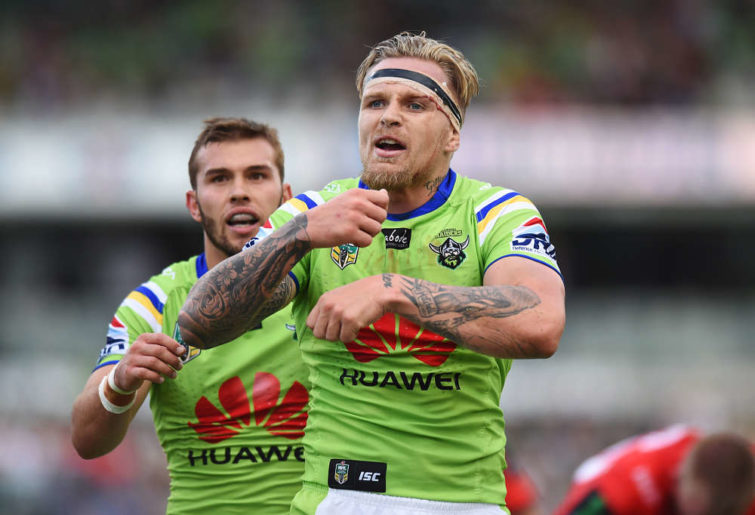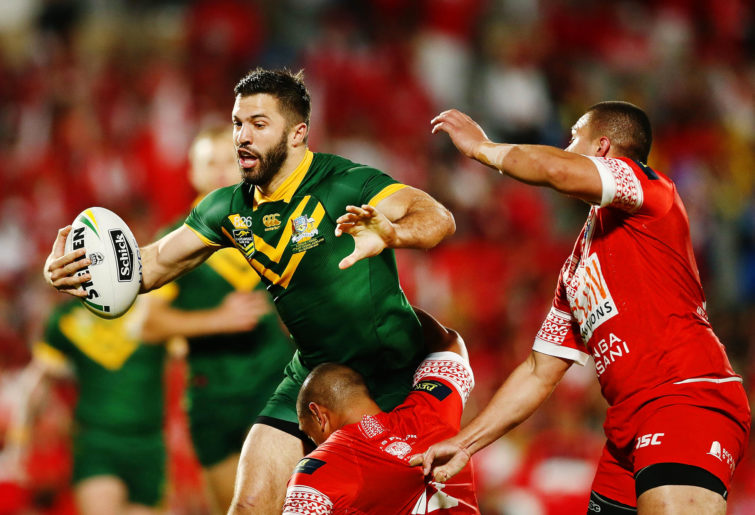Why all the pieces now Fitz for Sharks to shed flat-track bullies reputation and show they’re the real deal
There is only one way for Cronulla to shake off their reputation for being flat-track bullies. They are off to an impressive start in…
Ah, eligibility. Whether it’s Greg Inglis or Maurie Fa’asavalu (remember him?), it’s the sporting gift to rugby league columnists that keeps giving.
And it is always a fresh issue because there are always new selections and non-selections we can debate. And there’s always emotion involved – you’ve got to remember what you’ve written before lest you be found out for playing the man (or the flag) and not the ball.
Today’s eligibility “row” (actually, no-one is shouting or even typing in capitals about it) is Australian-born Blake Austin being elevated to the England performance squad, meaning he’ll probably play for them in the World Cup Nines at Bankwest Stadium on October 18 and 19.
He qualifies through the grandparent rule, which raises the argument of whether tier one countries should be using that route to recruit players.
There are two ways one could be offended by such a development. These paths to offence works equally for the residency rule being applied – as it was when Semi Radradra played for Australia and Brent Webb turned out for the Kiwis.
One, do we want a player from Australia who would not make the Australian team? That’s a complaint I’ve heard from quite a few English people about Austin – the former Portugal Nines player would not make the Kangaroos – so why should we pick him?
The other way one could be offended is that the spirit of the grandparent rule in rugby league is that its there to help everyone but the top three and that Australia, England and New Zealand have an unspoken obligation not to invoke it.
We already have a two-tier system which has allowed countries which would not otherwise be competitive to become so competitive that in recent years – in full internationals and friendlies – Tonga has defeated the Kiwis, Fiji has defeated the Kiwis, Italy has beaten England and the United States have upset France.
If you don’t understand the two-tier system it’s pretty easy: if you miss selection for your tier one nation of choice, you can play for your tier two nation of choice.

Blake Austin.
(Photo: NRL images)
We thought we would need this to have competitive internationals (we had, and have, a lot of catching up to do when our professional leagues are based in just two countries) for the foreseeable future but by bolstering Tonga, we made it attractive enough for five players from the Kiwis and green-and-golds at the last World Cup to actually pick their tier two choice in preference to their tier one choice.
They turned their backs on the big, developing, rich nations of their residence and went for the tiny island of their heritage. This has, in turn, created a new powerhouse in our sport – the Mate Ma’a.
So far, so good.
But if players are now choosing a so-called developing nation over one of the Big Three, do we need the two-tier system anymore? Is it now redundant.
Before I give my thoughts, I want to touch on the wildcard in all this – Great Britain.
Great Britain – the team touring New Zealand and Papua New Guinea in October and November – is not a ranked rugby league-playing nation.
The home nations are all listed individually. Therefore, they are neither tier one not tier two and could theoretically pick Daly Cherry-Evans – who is eligible for England. He could play for GB one week and Australia the next without breaking any rules.
Under this curiosity, Lachlan Coote (Scotland) and Tyson Frizell (Wales) could play for the Lions without it having any impact on their future representative prospects in Australia.
This is an accident of history but actually it’s a good thing. It stops GB being just a glorified England and gives the whole concept a Barbarians type feel. I like it.
Back to the question at hand though: in rugby league we have gone a different way to other sports. We’ve got rules that take from the rich and give to the poor when it come to international eligibility, which could be argued to be in keeping with the sport’s culture.
You move to a country to earn a living playing sport, we send you back to where you came from to take part in international sport (if you want to go). You don’t necessarily make your country of residence stronger at international level just because it’s wealthy enough to have attracted you as a member of its workforce.
State of Origin was a counter to economic migration. Players went to NSW for money, Origin bought them back for rep football. That’s how the two-tier system in international football works.

James Tedesco, who once played for Italy, takes the field for Australia against Tonga. (Photo by Anthony Au-Yeung/Getty Images)
It’s not how most international sport works.
Britain great Garry Schofield said on the Forty20 Live streamed TV show last night that he doesn’t “want Australians in the dressing room”.
Host Mark Wilson then pointed out that the coach is Australian and that if that’s the way he felt, he shouldn’t have been cheering England in the cricket…
One, we’re not ready to get rid of the two tier system because it’s still only a trickle of players willing to take a permanent hit in the hip pocket to represent a smaller league country.
Italy, Lebanon, Cook Islands … they need the two tier system to be competitive.
If you say that makes it fake, I won’t argue. But we need fake to run a World Cup every four years to finance the development of our sport, otherwise the RLIF has no money. So a few more years of fakery, please.
My other thoughts are that the big three don’t need residency or the grandparent rule and it should be taken off the table for them. They have enough players to pick from without using these mechanisms.
Biased against them? Of course – the current system is already biased against them. We dole their players out to other countries. Everyone knows that, we’re trying to even up our international competition.
That change would be completely in keeping with the two-tier system. It might not be fair to Blake Austin but it’s not really fair if he takes up an import quota and needs a work visa to play in the country he is about to represent, either….